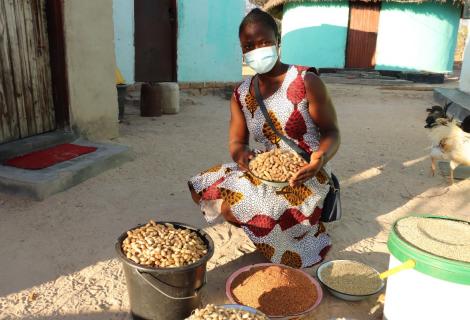World Food Day: Women farmers most at risk from Covid-19 food crisis

Women already on the frontlines of the climate crisis, are bearing the brunt of rising hunger due to Covid-19 as they skip meals so that their children can eat and face rising levels of gender-based violence.
Early findings from ActionAid research into how measures to control Covid-19 are affecting the lives of women smallholder farmers across 14 countries in Africa and Asia*, show how market closures, travel restrictions and soaring food prices are negatively affecting rural communities and jeopardising the next planting season.
Catherine Gutundu, ActionAid’s head of resilient livelihoods and climate justice, says:
“Around the world, Covid-19 has left women farmers indebted and hungry. Many of them now can't afford to plant for the next season. A dangerous spiral of increasing hunger and poverty could set in unless governments urgently increase their support to family farmers now.”
ActionAid is calling on governments to prioritise investment in sustainable, climate-resilient local food systems as part of Covid-19 recovery plans.
The summary report, based on a survey of 190 women farmers and local leaders in September, finds:
- Covid-19 related market closures and lockdowns have severely affected earnings and food security. 83% of women farmers reported a loss of livelihoods during the pandemic, with 65% saying they are experiencing food shortages.
- More than half (55%) of women said their unpaid care and domestic work has increased during the pandemic.
- Women are prioritising their children’s needs over their own, many reported skipping meals or eating smaller portions, so their families have enough to eat. 58% of women said members of their household skipped meals during lockdown.
- More than half (52%) of respondents said there has been an increase in gender-based violence. Women said there had been an increase in men forcefully taking money from their wives, rising incidents of police harassing women and girls, and difficulties reporting cases of violence to relevant authorities. 64% of women said lockdown had made women and girls more susceptible to abuse and exploitation.
Women farmers report rising hunger and increasing violence:
Speaking about the violence facing women in her community, Yandeh Gissey, a smallholder farmer from Upper Niumi in The Gambia, says: “We are witnessing physical abuse to women and girls by men.. Especially where the women used to provide for the family and now they cannot, the husband is always violent.”
In Malawi, Alinafe Nkhoma, a smallholder farmer in Phalombe district has struggled to find enough, nutritious food for her family since losing her livelihood to Cyclone Idai destroyed her farmland in 2019. This year, her harvest was affected by drought and now the global pandemic has further affected her ability to sell her produce.
To survive and feed her family, she walks for four hours to gather Mikawa, a wild poisonous tuber, which has to be boiled for six hours before being safe to eat.
“Due to hunger in the area, the scramble for the wild tubers has become high,” she says. “On a daily basis there about 100 families in the mountains digging for tubers and one has to count themselves lucky if they find the tubers in good time.”
On World Food Day, ActionAid is calling on governments to bailout women farmers ahead of the next planting season to avert a Covid-induced food crisis. This should include:
- Support for the next planting season: seed capital and access to interest-free loans and credit to allow women farmers to invest in farming activities.
- Support to better adapt to the climate crisis and training in agroecological farming practices that build climate resilience and improve the productivity and fertility of soils.
- Investment in roads and transport is needed to make them safer for women farmers to travel to access markets and urban areas to sell their produce.
- Governments enforcing legal frameworks to protect the rights of farmers by monitoring markets, regulating food prices and keeping supply chains functioning.
- Women farmers must have access to and control over their land and other natural resources, which in many countries is denied to them and fraught with legal and administrative barriers.
- Governments must fund the Global Agriculture and Food Security Programme (GAFSP), an innovative fund to support low-income countries’ agriculture introduced in the wake of the 2008 food crisis, to avoid another global hunger emergency.
Ends.
For more information and interviews contact Jenna.Pudelek@actionaid.org or call +447795642990.
Notes to editors:
Read how women farmers are surviving Covid-19, rising hunger and the climate crisis: https://actionaid.org/stories/2020/world-food-day-2020
*The research was conducted in Bangladesh, Democratic Republic of Congo, Ethiopia, Gambia, Ghana, Kenya, Malawi, Nepal, Rwanda, Senegal, Tanzania, Uganda, Zambia and Zimbabwe.
The study covered 190 individuals, including:
79 smallholder farmers- 80% being women smallholders
72 farmer leaders – 71 of whom were women farmer leaders, together representing 80,876 smallholder women farmers
22 were government officials, extension workers and NGO staff- of whom 12 were men and rest women, altogether reaching out to a rural population of 721,560 individuals in these countries.
17 were market vendors or market association members.